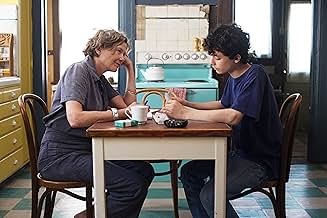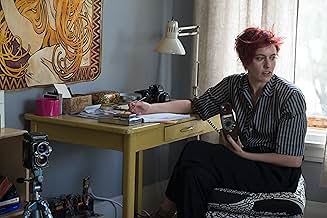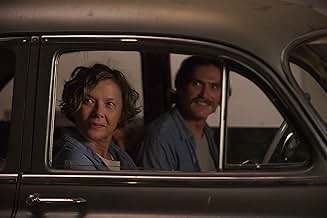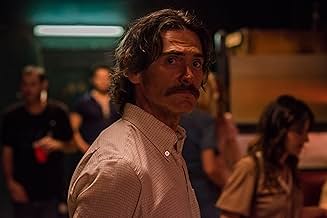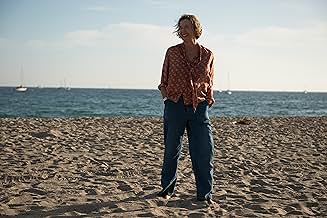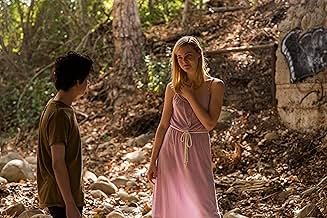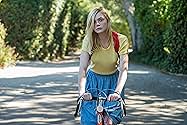IMDb-BEWERTUNG
7,3/10
51.403
IHRE BEWERTUNG
Die Geschichte von drei Frauen, die im Südkalifornien der späten 1970er-Jahre Liebe und Freiheit erkunden.Die Geschichte von drei Frauen, die im Südkalifornien der späten 1970er-Jahre Liebe und Freiheit erkunden.Die Geschichte von drei Frauen, die im Südkalifornien der späten 1970er-Jahre Liebe und Freiheit erkunden.
- Für 1 Oscar nominiert
- 15 Gewinne & 82 Nominierungen insgesamt
Vitaly Andrew LeBeau
- Young Jamie Fields
- (as Vitaly A. Lebeau)
Empfohlene Bewertungen
The status of "too personal" could be its basic virtue. and its sin. because it represents a chronicle. about "80 decade, about family life in large sense, about sexual education and motherhood. and, sure, about freedom. in same measure, it is a film with precise target. remembering independent films, near to every day details too much, it is the film who could be an experience, usuful in profound sense, or just waste of time. but, out of that too easy definitions, it is an admirable work. for script, performances - the kind of film in which each actor seems be the only wise choice for his character - but, first, for Annette Bening who does a magnificent job as middle age mother, in war against her past, insecure about future, without courage to become herself, appentice of her son, discovering the essence of life next her friends. a great film. really !
Greetings again from the darkness. Writer/director Mike Mills has found a niche, and a form of therapy, by exploring and exposing his life in a most public manner
on the silver screen. Beginners (2010) brought us the story of his father's (an Oscar winner for Christopher Plummer) late life pronouncement of homosexuality. This time, Mr. Mills turns his lens and his pen towards his mother, and he seems to understand her much better in retrospect than in the summer of 1979 when the film is set.
This can be viewed as the story of three women, masked as a coming-of-age story for a teenage boy. Annette Bening stars as Dorothea, a chain-smoking single mother in her mid-50's who seems to have surrendered to her own sadness and loneliness, while simultaneously trying to make sense of a changing world. One of her tenants is Abbie (Greta Gerwig), a photographer and NYC punk scene drop-out, who is now battling cervical cancer. The third female is the seemingly always present Julie (Elle Fanning), a sexually promiscuous and borderline depressive 18 year old who values the platonic friendship she has with Dorothea's 15 year old son Jamie (Lucas Jade Zuman).
Factor in another tenant in the form of laid-back handyman and former hippie William (Billy Crudup), and we have a makeshift family in a communal setting that seems almost normal for 1979 Santa Barbara. Dorothea enlists the other two women to show Jamie their lives – the intent being to influence his growth in ways an older mother can't. Of course, Jamie is at the age where exploring life isn't necessarily best served by tagging along on a trip to the gynecologist with Abbie or having no-touch sleepovers with Julie.
Ms. Bening finds her groove as the story progresses and we feel her struggling to connect to each of the characters. When William plays a Black Flag song, her reaction is priceless: "They know they're not good, right?" She doesn't mean it as a put down, but rather her attempt to understand why her son is drawn to this. An even more emotionally naked moment occurs when Jamie is reading a passage from "The Feminine Mystique" to his mother. It's a passage that captures what he thinks of her, as well as what she thinks of herself a mostly invisible woman finding it difficult to be a parent while also maintaining a self.
Mills is not one to be nostalgic or glorify the past. His brilliant writing includes lines like "Wondering if you are happy is a great short cut to being depressed." The movie can be slow moving at times, but it's the best I've seen in awhile at expressing what makes us tick. The film is what Running with Scissors should have been. Real people are sometimes interesting, sometimes boring, and sometimes annoying. Each of the characters here are all of the above (just like you and me).
This can be viewed as the story of three women, masked as a coming-of-age story for a teenage boy. Annette Bening stars as Dorothea, a chain-smoking single mother in her mid-50's who seems to have surrendered to her own sadness and loneliness, while simultaneously trying to make sense of a changing world. One of her tenants is Abbie (Greta Gerwig), a photographer and NYC punk scene drop-out, who is now battling cervical cancer. The third female is the seemingly always present Julie (Elle Fanning), a sexually promiscuous and borderline depressive 18 year old who values the platonic friendship she has with Dorothea's 15 year old son Jamie (Lucas Jade Zuman).
Factor in another tenant in the form of laid-back handyman and former hippie William (Billy Crudup), and we have a makeshift family in a communal setting that seems almost normal for 1979 Santa Barbara. Dorothea enlists the other two women to show Jamie their lives – the intent being to influence his growth in ways an older mother can't. Of course, Jamie is at the age where exploring life isn't necessarily best served by tagging along on a trip to the gynecologist with Abbie or having no-touch sleepovers with Julie.
Ms. Bening finds her groove as the story progresses and we feel her struggling to connect to each of the characters. When William plays a Black Flag song, her reaction is priceless: "They know they're not good, right?" She doesn't mean it as a put down, but rather her attempt to understand why her son is drawn to this. An even more emotionally naked moment occurs when Jamie is reading a passage from "The Feminine Mystique" to his mother. It's a passage that captures what he thinks of her, as well as what she thinks of herself a mostly invisible woman finding it difficult to be a parent while also maintaining a self.
Mills is not one to be nostalgic or glorify the past. His brilliant writing includes lines like "Wondering if you are happy is a great short cut to being depressed." The movie can be slow moving at times, but it's the best I've seen in awhile at expressing what makes us tick. The film is what Running with Scissors should have been. Real people are sometimes interesting, sometimes boring, and sometimes annoying. Each of the characters here are all of the above (just like you and me).
9Lele
I understand the rage of many other US reviewers because this movie is so far from usual Hollywood clichés that it does not even look like an US movie! It seems an European movie. Bergman, Fellini and stuff...
It is NOT boring. It has its pace and it is exacly what it has to be.
I identified myself at different levels. I was born in 1958, just like the main actress (great performance). And like Dorothea I had a daugther when I was in my 40s (she now is 15, like Jamie, Dorothea's son) and I don't know how to talk to her, I don't like much of the music she likes and so on.
I was a teenager in the 70s, so I identified with Jamie, great character: I wish I had one thousandth of his self-consciousness when I was his age!
This movie was oxygen for suffocating US major's movies, after sequels and remakes and CGI shows finally something to think about.
This movie was oxygen for suffocating US major's movies, after sequels and remakes and CGI shows finally something to think about.
"20th Century Women" (2016 release; 118 min.) brings the story of Dorothea, a divorced woman in her mid-50s, and her 15 yr. old son Jamie. As the movie opens, we are reminded it is "Santa Barbara, 1979", and Dorothea's car is engulfed in flames while she and Jamie were grocery shopping. When they finally get home, we also get to know Abbie, a 24 yr. old orange-haired photographer, and William, a Mr. fix-it-all, who both are renting rooms at Dorothea's house. Then there is Julie, the 17 yr. old who hangs out at the house for no apparent reason. When Dorothea feels she cannot handle the unruly(?) Jamie by herself, she enlists the help of Abbie and Julie. At this point we're 15 min. into the movie, but to tell you more of the plot would spoil your viewing experience, you'll just have to see for yourself how it all plays out.
Couple of comments: this is the long-awaited new movie from writer-director Mike Mills, who last surprised us with the outstanding "Beginners" (now already 6+ years ago). Here he brings a character study of a group of 5 people in the late 70s. This movie immediately connected with me, as I saw pieces of myself in "young" people: Abbie (Born 1955), Julie (born 1962) and Jamie (born 1964). I was born in 1960. The movie features an all-star ensemble cast, with an almost unrecognizable Great Gerwig as Abbie (and on the heels of another outstanding role in the recent "Jackie"), Elle Fanning in perhaps her best role to date as Julie, Billy Crudup as William, and newcomer Lucas Jade Zumann as Jamie. Surely we have not seen the last of him. But the biggest applause must go to Annette Bening, who brings perhaps the finest performance of her career as the well-intended but at times confused, sad and/or lonely Dorothea. Mills brings us these characters in rich detail and nuance, much to the viewing public's delight. Ever wonder what a "cool cigarette walk" is like? You'll find out in the movie. Music plays a ventral role in the movie. There is a fine original score (mostly electronic) by Roger Neill, but even better are the song placements (Talking Head, Black Flag, David Bowie, the Clash, and many others).
"20th Century Women" premiered to great acclaim at the New York Film Festival last Fall. The movie opened wide this weekend and I couldn't wait to see it. The Friday evening screening where I saw this at was attended nicely although by no means close to a sell-out. Doesn't matter. This is one of the finer movies of the year, for me anyway. If you like a richly-developed character study with an all-star ensemble cast, you cannot go wrong with this, be it in the theater, on VOD or eventually on DVD/Blu-ray. "20th Century Women" is HIGHLY RECOMMENDED!
Couple of comments: this is the long-awaited new movie from writer-director Mike Mills, who last surprised us with the outstanding "Beginners" (now already 6+ years ago). Here he brings a character study of a group of 5 people in the late 70s. This movie immediately connected with me, as I saw pieces of myself in "young" people: Abbie (Born 1955), Julie (born 1962) and Jamie (born 1964). I was born in 1960. The movie features an all-star ensemble cast, with an almost unrecognizable Great Gerwig as Abbie (and on the heels of another outstanding role in the recent "Jackie"), Elle Fanning in perhaps her best role to date as Julie, Billy Crudup as William, and newcomer Lucas Jade Zumann as Jamie. Surely we have not seen the last of him. But the biggest applause must go to Annette Bening, who brings perhaps the finest performance of her career as the well-intended but at times confused, sad and/or lonely Dorothea. Mills brings us these characters in rich detail and nuance, much to the viewing public's delight. Ever wonder what a "cool cigarette walk" is like? You'll find out in the movie. Music plays a ventral role in the movie. There is a fine original score (mostly electronic) by Roger Neill, but even better are the song placements (Talking Head, Black Flag, David Bowie, the Clash, and many others).
"20th Century Women" premiered to great acclaim at the New York Film Festival last Fall. The movie opened wide this weekend and I couldn't wait to see it. The Friday evening screening where I saw this at was attended nicely although by no means close to a sell-out. Doesn't matter. This is one of the finer movies of the year, for me anyway. If you like a richly-developed character study with an all-star ensemble cast, you cannot go wrong with this, be it in the theater, on VOD or eventually on DVD/Blu-ray. "20th Century Women" is HIGHLY RECOMMENDED!
"Guys aren't supposed to look like they're thinking about what they look like." Julie (Elle Fanning)
No they're not, but in Mike Mills' 20th Century Women, some rules don't apply, and the young man, Jamie (Lucas Jade Zumann), is well on his way to come of age in a most unusual household. It's 1979, before the Internet and Reagan and after the Punk rage. In other words, it's a time of cultural and personal transition.
No one is more responsible for this cultural migration in the Fields family than Dorothea (Annette Bening), a middle-aged matriarch with wit and lungs that will, in 20 years, surrender to the assault of her incessant smoking (her voice-over narration tells us so). Dorothea has the calm, contemplative, accepting nature to guide her two children, Jamie and Abbie (Greta Gerwig), into a responsible adulthood prefaced by sexual exploration and establishment defiance.
Although I rarely comment on acting, I must single out Bening for a performance of rich nuance, eschewing the theatrics of Oscar baiting to give us a character with immense affection and uncertainty, just like many of us, I suspect. Her low-key but powerful interpretation should get an Oscar nod.
While the examination of teen sexuality in flux is well described, so too is Dorothea's odyssey from a broken marriage to a Zen-like acceptance. As in the iconic Seinfeld world, nothing seems to be happening. However beneath that middle-class ambiance lie hearts struggling with their own shifting shapes under the watchful eye of family.
20th Century Women is all about the overwhelming part family plays in human development, not in grandly dramatic exercises but in the small notes like sitting in bed chatting or going with mother to a nightclub. As the credit sequence will tell you, life turns out fairly well despite the uncertainties of daily vicissitudes documented so distinctly here.
No they're not, but in Mike Mills' 20th Century Women, some rules don't apply, and the young man, Jamie (Lucas Jade Zumann), is well on his way to come of age in a most unusual household. It's 1979, before the Internet and Reagan and after the Punk rage. In other words, it's a time of cultural and personal transition.
No one is more responsible for this cultural migration in the Fields family than Dorothea (Annette Bening), a middle-aged matriarch with wit and lungs that will, in 20 years, surrender to the assault of her incessant smoking (her voice-over narration tells us so). Dorothea has the calm, contemplative, accepting nature to guide her two children, Jamie and Abbie (Greta Gerwig), into a responsible adulthood prefaced by sexual exploration and establishment defiance.
Although I rarely comment on acting, I must single out Bening for a performance of rich nuance, eschewing the theatrics of Oscar baiting to give us a character with immense affection and uncertainty, just like many of us, I suspect. Her low-key but powerful interpretation should get an Oscar nod.
While the examination of teen sexuality in flux is well described, so too is Dorothea's odyssey from a broken marriage to a Zen-like acceptance. As in the iconic Seinfeld world, nothing seems to be happening. However beneath that middle-class ambiance lie hearts struggling with their own shifting shapes under the watchful eye of family.
20th Century Women is all about the overwhelming part family plays in human development, not in grandly dramatic exercises but in the small notes like sitting in bed chatting or going with mother to a nightclub. As the credit sequence will tell you, life turns out fairly well despite the uncertainties of daily vicissitudes documented so distinctly here.
Wusstest du schon
- WissenswertesDuring rehearsals, the cast was encouraged to bring in music they believed their characters listened to. Then, to encourage familiarity among the cast, there would be a dance party where the only rule was that everyone had to dance and it didn't matter what the song was.
- PatzerDorothea is variously depicted discussing her stock portfolio with her son Jamie, quoting NYSE share prices in decimals, doing this in 1979. However, the switch to decimal from fractional stock prices in the U.S. did not occur until the year 2000.
- VerbindungenFeatured in WatchMojo: Top 10 Movies of 2016 Already Getting Oscar Buzz (2016)
- SoundtracksDon't Worry About the Government
Written by David Byrne
Performed by Talking Heads
Courtesy of Sire Records
By arrangement with Warner Music Group Film & TV Licensing
Top-Auswahl
Melde dich zum Bewerten an und greife auf die Watchlist für personalisierte Empfehlungen zu.
- How long is 20th Century Women?Powered by Alexa
Details
- Erscheinungsdatum
- Herkunftsland
- Offizielle Standorte
- Sprache
- Auch bekannt als
- Mujeres del siglo XX
- Drehorte
- East Beach, Santa Barbara, Kalifornien, USA(Santa Barbara, CA)
- Produktionsfirmen
- Weitere beteiligte Unternehmen bei IMDbPro anzeigen
Box Office
- Budget
- 7.000.000 $ (geschätzt)
- Bruttoertrag in den USA und Kanada
- 5.664.764 $
- Eröffnungswochenende in den USA und in Kanada
- 111.200 $
- 1. Jan. 2017
- Weltweiter Bruttoertrag
- 7.214.806 $
- Laufzeit1 Stunde 59 Minuten
- Farbe
- Sound-Mix
- Seitenverhältnis
- 2.00 : 1
Zu dieser Seite beitragen
Bearbeitung vorschlagen oder fehlenden Inhalt hinzufügen








